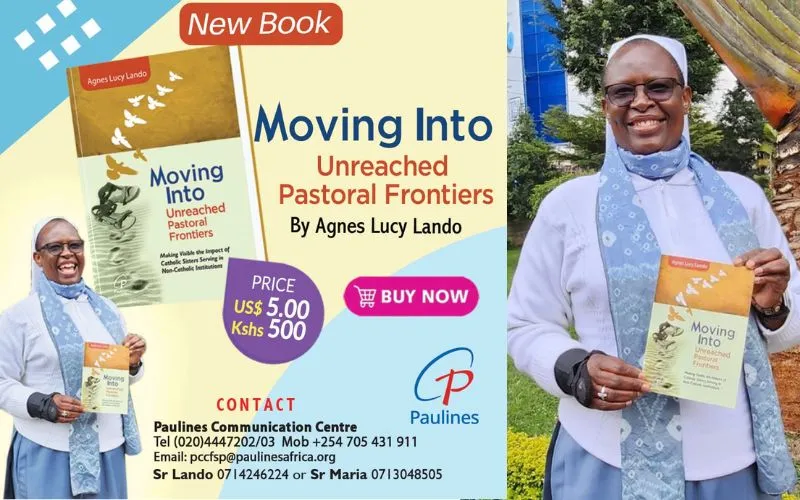Information reaching the office of RCOWACERAO NEWS AGENCY, RECONA narrated the joys and Struggles of Catholic Sisters Working in Non-Catholic Institutions in Africa. “To be a servant of God anywhere is not easy. But for a Catholic Sister, to serve in a non-Catholic institution is a different call altogether,” this is how Sr. Prof. Agnes Lucy Lando starts our conversation.
“It is a big struggle,” Sr. Lando who lectures at Daystar University in Kenya tells ACI Africa, adding that Catholic Sisters who work in non-Catholic settings have to work extra hard, sometimes surrounded by hostility, to keep the Evangelical Counsels, the set of three vows of chastity, poverty, and obedience that are at the heart of the life of women and men Religious.
The Kenyan member of the Religious Congregation of the Sisters of Mary of Kakamega (SMK) spoke to the Catholic media on Thursday, June 29, a few days after her book, “Moving into the Unreached Pastoral Frontiers: Making Visible the Impact of Catholic Sisters working in non-Catholic Institutions”, was released.
The book, the latest by the widely published University professor, offers a unique insight into the joys, as well as the struggles of Catholic Sisters serving in what she describes as unventured pastoral territories.
The book is Sr. Lando’s attempt to shine a light on the experiences and impact of women Religious serving in non-Catholic institutions, especially within the Eastern and Central regions of Africa. The project is also an appeal to the Church to be attentive to the needs of these Catholic Sisters, who she says are serving in difficult conditions.
In Kenya, for instance, the faith of Catholic Sisters serving in non-Catholic settings in education, healthcare and social services, is “tested and strengthened”, Sr. Lando says, adding that women Religious in such settings experience the joy of impacting individuals and communities.
At the same time, the Catholic Sisters “feel alone”, according to testimonies published in Sr. Lando’s book. Their challenges are diverse, including lack of Eucharistic celebrations and access to other Sacraments, mistreatment by those in authority at their places of work, as well as being perceived as “outsiders” in some of the institutions.
“There is some sense of comfort for a Catholic Sister working in a Catholic institution because there, one can easily attend Holy Mass, go for retreats, have personal prayers in a chapel, and even see Priests for their other spiritual needs,” Sr. Lando says, and adds, “Non-catholic institutions don’t provide such comforts.”
“There is no time for Mass in non-Catholic institutions and a Catholic Sister working in such institutions has to be more responsible to live their vowed lives, to live their Christian lives, and to serve. They have to intentionally go out and look for Holy Mass and recollections to nourish their spiritual lives,” she says.
Some Catholic Sisters who shared their experiences included in Sr. Lando’s book said that in some of these institutions, they are treated as outsiders, and sometimes, attempts are made to convert them from Catholicism.
Additionally, some of the non-Catholic institutions do not allow Catholic Priests to come in to celebrate Holy Mass, to hear Confessions, or to take care of any of the pastoral needs of the Catholic community there.
“I gathered testimonials of Catholic Sisters, who said they do not have the liberty to observe Church solemnities that do not fall on Sundays, as their employers demand that they work on all weekdays,” she told the media during the August 29 interview.
In the book that Paulines Publications Africa (PPA) published, a teacher shares, “You have to be in school and teach regardless of any religious occasion.”
According to Sr. Lando, there is also tough competition among various faiths in the public institutions, with every denomination fighting for superiority and recognition from the institutions’ authorities.
Women Religious working for government institutions may also be transferred to places where their Religious Orders do not have communities, the Former Director of Research and Postgraduate Studies at Daystar University says.
Kenyan Nun Appeals to Catholic Bishops to Address Pastoral Needs of Women Religious Serving in Non-Catholic Institutions
She explains, “Some of these non-Catholic institutions do not understand our way of life as Consecrated people. They don’t bother to know that a Catholic Sister can’t live alone and must stay in a community. They send you to a place where you don’t have a community and expect you to stay in a rented house by yourself.”
In some non-Catholic institutions where women Religious are serving, the demand to help those in need, especially the poor is so much. “When people know that one is a Sister, they imagine that you have the ability to take care of their needs. They don’t believe that we also lack,” Sr. Lando says.
She adds that sometimes, potential donors develop cold feet when they learn that the Sisters are working in non-Catholic institutions. There are those who she says only trust the structures within the Catholic Church when it comes to funding.
Notwithstanding the challenges, women Religious serving in non-Catholic settings are highly respected, the Nairobi-based SMK member says. The institutions for which they work are usually highly esteemed even by non-Catholics, Sr. Lando says.
She continues, “Catholic Sisters working in non-Catholic schools, for instance, earn the schools a lot of respect from learners, parents the communities in which they operate. I spoke to a Catholic Sister teaching in a non-Catholic school who the school uses to calm the students whenever they threaten to go on strike. In this way, the Sister is the school’s unifying factor, problem-solver and peace-bringer.”
- CATHOLIC ARCHBISHOP IN GHANA HAILS POPE LEO XIV AS GOD’S GIFT - 23 mai 2025
- POPE LEO XIV TO APPROVE CANONIZATIONS - 22 mai 2025
- THE EVOLUTION OF PAPAL TRANSPORTATION - 20 mai 2025







